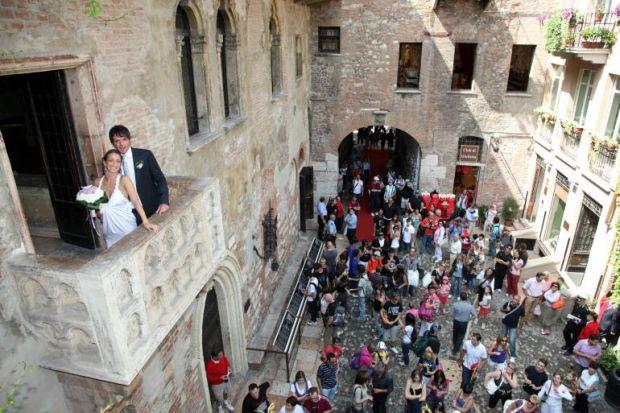To Juliet 'About' Love!
ITA:

image courtesy Quotidiano.net
There is a famous house in the heart of Verona which is at least seven hundred years old and whose carved stone balcony has even become legendary. At least half a million people come and stand beneath it every year. There isn't really anything in particular to see, but tourists gaze up at it captured, almost as if the place were holy or magic. The guides explain that this is Juliet's balcony, right from this balcony, her long golden tresses hanging loose, she spoke of love to her beloved Romeo. Obviously, we have no evidence of this, the residence is believed to have once housed Juliet because it was the Cappello family's home, and according to legend, the Cappellos were the Capulets of Shakespeare's play. In fact, the address of the famous balcony is Via Cappello, Number 23.
Obviously, Romeo and Juliet, the two lovers famous all over the world, only existed in William Shakespeare's brilliant imagination and the minds of those earlier writers who had seized upon and enveloped the universal theme of hopeless love. So the story of Romeo and Juliet is only a legend after all. But it is perhaps the tenderst, most delicate and tragic legend in Italy, a country where mythology, religion and popular traditions have inspired such a variety of stories, though they are rarely about love. Yes, it is a legend, but when the collective imagination, over the centuries, comes to feel this legend deeply, fiction ends up by becoming a colourful, emotional reality.
This is why at least ten thousand letters addressed to "Juliet - Verona- Italy" arrive in Verona every year. Young people in love from all over the world confide their hopes, and sometimes their delusions, to the young girl who lives in the legend, the chosen guides of star-crossed lovers. The most surprising thing is that she actually replies. It all started when, in 1937, Ettore Solimani, director of the local Civic Museum, received the first letter addresses to "Juliet- Verona". He decided to answer to that request of help and from that moment onwards, letters started to arrive in the hundreds.
The legacy of Solimani, passed then to Gino Beltrami, poet and journalist, and today it is the very active Club di Giulietta which answers passionately to the many letters that continue to arrive. Obviously, today Juliet receives also emails and lots of cards that visitors leave on the wall of the "Capulets' House" in Verona. Some of the letters and requests sent to Verona are now collected in a book entitled "Lettere a Giulietta" by Lise and Ceil Friedman. The idea of the book came by chance. Ceil, one of the two sisters, met her husband in Verona and moved there. While taking some tourists to visit Juliet's house, she found some of these letters that intrigued her very much, so she asked her sister to help her writing a book about the story of Juliet and the interest this character still attracts today including some of the letters found on the wall of the house in Verona.
Considering all this, it does not come as a surprise, that the Italian city of Verona is now trying to woo the world's couples into tying the knot on the scene of Romeo and Juliet's most romantic encounter. Under the planned scheme spouses-to-be would say their vows on the balcony from which William Shakespeare's heroine is thought to have summoned her Romeo. One thing about Juliet is certain, that in 1595 when Shakespeare wrote his five-act tragedy, he would have never dreamt that the ghosts of his literary characters were destined to become a model and a symbol for generations to come and a tourist attraction.
C'è una casa famosa, nel cuore di Verona, vecchia almeno di settecento anni ed il suo piccolo balcone di pietra scolpita è addirittura leggendario. Là sotto, ogni anno, si ferma almeno mezzo milione di persone. Non c'è niente in particolare da vedere, eppure i turisti guardano in alto ammirati, quasi con la stessa devozione dovuta ad un luogo sacro o magico. Le guide spiegano che si tratta del balcone della casa di Giulietta, proprio da questo balcone la ragazza si affacciava con la bionda treccia sciolta, per parlare d'amore con il suo Romeo, il suo grande amore. Ovviamente, non si hanno conferme di ciò, si pensa che Giulietta abbia vissuto in questa casa perchè era la residenza della famiglia Cappello, che, secondo la leggenda, erano i Capuleti dell'opera di Shakespeare. In fatti, l'indirizzo del famoso balcone è Via Cappello, Numero 23.
Naturalmente, Giulietta e Romeo, gli innamorati infelici famosi in tutto il mondo, sono il frutto della fantasia geniale di William Shakespeare, e di quegli scrittori che prima di lui avevano raccolto ed elaborato il tema universale del grande Amore senza speranza. Romeo e Giulietta appartengono dunque alla leggenda, forse la più tenera, delicata e insieme tragica leggenda d'Italia, un paese dove la mitologia, la religione, la tradizione popolare hanno animato molte storie possenti, di varia intonazione, ma quasi sempre scarne di autentici accenti amorosi. Una leggenda, certamente, ma quando l'immaginario collettivo, attraverso i secoli, fa propria una leggenda che sente profondamente, la finzione finisce per assumere i colori e le emozioni della realtà.
Così accade che ogni anno arrivano a Verona almeno diecimila lettere, indirizzate "A Giulietta - Verona - Italia". Ragazze e ragazzi innamorati, di ogni parte del mondo, affidano le loro speranze, talvolta le loro illusioni, alla fanciulla che vive nella leggenda, eletta guida degli innamorati. La cosa più stupefacente è che lei risponde.Tutto ebbe inizio, quando nel 1937, Ettore Solimani, direttore del Museo Civico, riceve la prima lettera indirizzata a “Giulietta, Verona”. Di fronte alla richiesta di aiuto, decide di rispondere, e da lì in poi le lettere centuplicano.
L’eredità di Solimani passa al professor Gino Beltramini, poeta e giornalista, ed oggi è l’attivissimo Club di Giulietta che risponde con passione e assiduità alle tante lettere che continuano ad arrivare. Ovviamente, oggi la bella Giulietta riceve anche emails e biglietti che i visitatori lasciano sul muro di "Casa Capuleti" a Verona. Parte delle lettere e richieste inviate a Verona ora sono raccolte in un libro dal titolo “Lettere a Giulietta” di Lise e Ceil Friedman. L’idea è nata per caso. Ceil, una delle due sorelle, ha incontrato a Verona il marito e si è trasferita nella città. Mentre accompagnava dei turisti alla Casa di Giulietta, ha trovato alcune di queste lettere che la hanno incuriosita molto, così ha chiesto alla sorella di aiutarla a scrivere un libro sulla storia di Giulietta e sull'interesse che il suo personaggio ancora oggi suscita includendo alcune lettere trovate sul muro della casa di Verona.
In considerazione di tutto ciò, non deve soprendere dunque, che la città di Verona sta adesso corteggiando le coppie di tutto il mondo per dire il proprio "Sì" nel luogo dell'incontro più romantico fra Romeo e Giulietta. Il progetto prevede che gli sposi si scambino la promessa di matrimonio proprio sul balcone dal quale l'eroina di William Shakespeare avrebbe chiamato il suo Romeo. Una cosa su Giulietta è certa, che nel 1595 quando Shakespeare ultimò la sua tragedia in cinque atti, non avrebbe mai immaginato che i suoi fantasmi letterari sarebbero stati eletti a modello simbolo attraverso il fluire delle generazioni e sarebbero diventati un'attrazione turistica.











